Tips for spotting fake sourdough bread at the store so you don’t waste your money on a phony product that is an unhealthy choice.
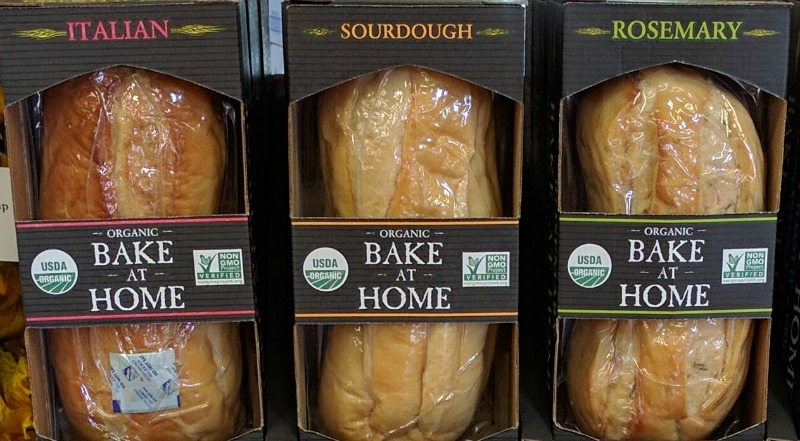
As awareness of the benefits of sourdough bread increases, so does the potential for food manufacturers – both large and small – to exploit the term.
And exploit it they most certainly do!
I recently examined every single loaf of bread at a local health food store. I found only one out of over half a dozen that claimed to be “sourdough” that was leavened in a traditional manner. No, it wasn’t The Essential Baking Company sourdough bread in the picture above. You won’t believe what this company is doing to fool consumers. Even I was shocked, and I thought I had seen it all.
If you choose to buy instead of making sourdough bread yourself (yes, it is a bit time-consuming!), then be on the lookout for fake sourdough!
It is literally everywhere!
Spotting phony sourdough is a more difficult process than you might think due in part to the sourdough myths that seem to abound.
When I first set out to write this article, I thought it would be fairly straightforward to explain. As it turns out, spotting a fake sourdough is rather tricky due to unethical food manufacturer tactics that are far sneakier and devious than I ever imagined.
You really need to be on your toes when sourcing sourdough bread to ensure that you aren’t wasting your money on a product you thought was a healthy choice for your family, but in fact, was quite the opposite.
If you use reading glasses, be sure to always bring a pair with you into the store so you can read the fine print on the packaging. If you wait until you get home to take a look, chances are you are going to be disappointed.
Fake Sourdough Masquerading as Real
The picture above shows one of the most popular fake sourdoughs on the market as of this writing. I was asked to take a look at it by a reader who thought it was legit. This brand is available at many health food stores. At my local Whole Foods, it is very prominently placed with an attractive display right near the checkout lines.
Some folks have notified me that it is also available at Sam’s Club and Walmart mega-supermarkets too!
Notice how the company has taken great care to appeal in every way to the health-conscious, time-challenged consumers:
- The loaf is clearly labeled “Sourdough”.
- The USDA Organic certification is front and center on the box.
- The NonGMO Verified label is prominently shown.
- The term “Bake at Home” is used to catch the eye of time-strapped consumers, some of whom WANT to provide fresh-baked sourdough for their family, but just don’t have the time.
I give this label a 10 out of 10. Fantastic marketing that is sure to move those boxes off the shelf like hotcakes. It’s even priced like a real sourdough would be at $6+/loaf where I live.
Watch Out for Ingredients Listed on the Box vs Online
Here’s the sneaky part. The ingredients on the label of this phony sourdough are DIFFERENT than what is on the website. Yes, the company has obviously done its research. Consumers are increasingly checking out products online before buying.
Don’t fall for this trick. Below is an online screengrab from December 28, 2016, of the ingredients for this company’s “sourdough” bread:
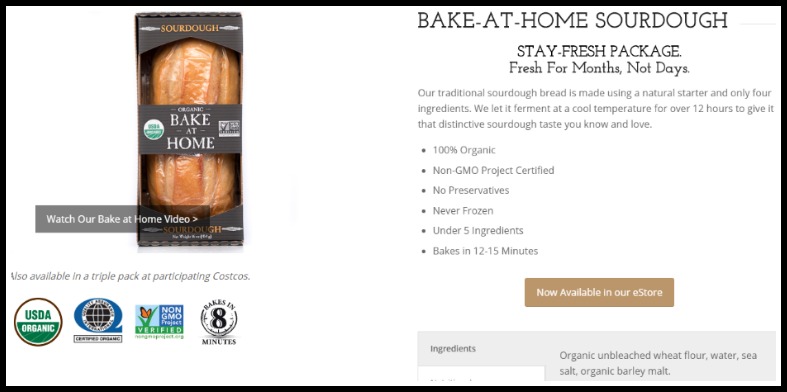
Notice the ingredients say: organic unbleached wheat flour, water, sea salt, organic barley malt.
To semi-researched consumers who know enough about sourdough bread to understand that it never contains yeast, this is enough information to fool them and get them to buy.
Take care not to be easily fooled, however! Look what I found when I looked at the actual label of this very same sourdough bread at the store. Check out the photo below taken on the very same date – December 28, 2016.
The exact same sourdough bread has YEAST listed on the box!
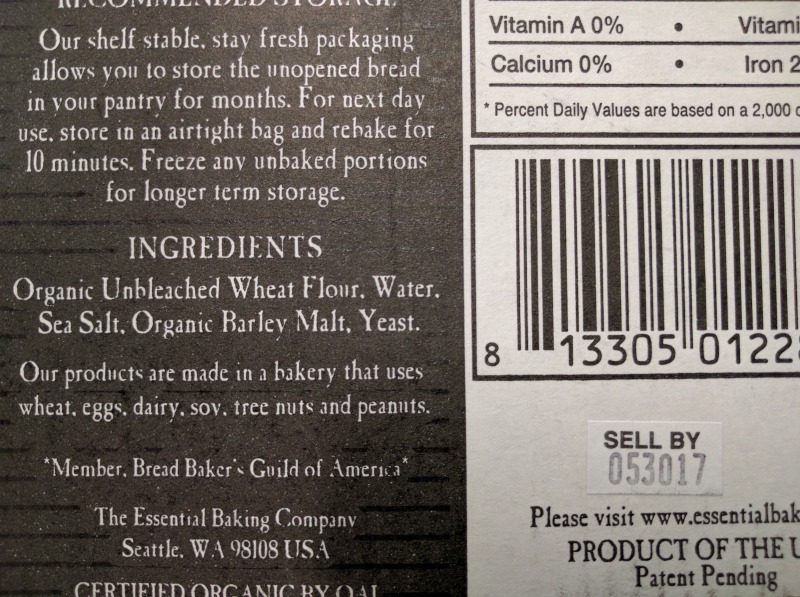
This is a new tactic I have not been aware of before … listing different ingredients for a product online versus what is on the label. Online it states “under five ingredients” using a “natural starter” with the bread “fermented” at a cool temperature for over 12 hours. The box at the store, however, lists 5 ingredients and the “natural starter” turns out to be yeast, which is most decidedly unnatural when it comes to sourdough! Other problems with this bread include the use of sweetener (organic barley malt) and white flour.
If a product seems too good to be true, it probably is.
I mean, seriously? Would an authentic sourdough come in a convenient “bake at home in 12-15 minutes” package that is shelf-stable for nearly 6 months?
Absolutely not!
The short video below summarizes the issues and how to spot the good stuff.
Authentic Labels
The label of true sourdough bread is going to list sourdough starter instead of yeast in the list of ingredients. For example, the gluten-free sourdough bread I buy from a local bakery has “cultured brown rice flour” listed as the starter.
The wording for the sourdough starter varies from brand to brand.
However, there will usually be some indication of a cultured starter as the leavening agent.
This starter contains natural beneficial yeasts from the environment rather than processed baker’s yeast which increases baking speed and baking temperature.
This is important because naturally leavened bread is more digestible, nutritious and less likely to trigger allergy problems than modern, yeast rise bread.
Ultimately, the consumer really must take the time to ensure that the sourdough bread of their choosing really is what it claims.
The Sourdough Bread I Buy
Real sourdough bread is so difficult to find that I’ve resorted to shipping freshly baked sourdough direct from the bakery to my door.
The bakery I use is Organic Bread of Heaven and I order the Rustic Sourdough. I ship in six loaves at a time and freeze what I won’t use in 4-5 days. They also have sourdough bagels, tortillas, hamburger buns, and English muffins among other authentic items.
Free shipping is available for orders over $49 (ask a friend to jump in with you!). The price is several dollars cheaper per loaf than the bread at the health food store.
To give it a try, use coupon HEALTHYHOME (all caps) for 10% off your first order.
Even if you pay shipping by ordering just a few real sourdough loaves, the price per loaf is still comparable to the fake sourdough at the health food store!
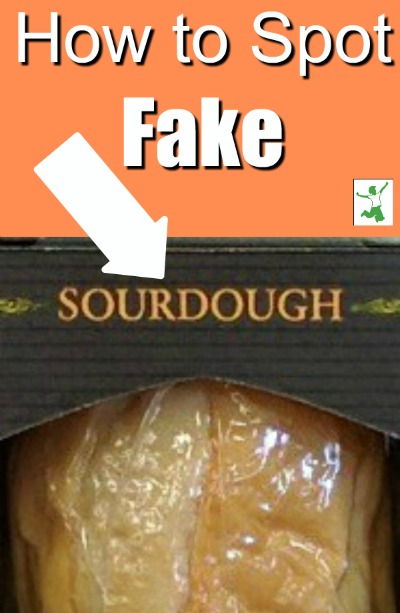
Rules of Thumb
Here are some rules of thumb to identify authentic sourdough bread:
- A handful of ingredients
- No yeast
- Cultured flour starter
- No sweetener
- Made using whole grain flour
- The dough ferments before baking for at least 4-6 hours
After examining the label, if you are still unsure, make a phone call or email to the company. Ask how long the sourdough is allowed to rise (double in size) before baking.
A true sourdough is going to rise for a minimum of about 4-6 hours and even as long as 10-15 hours depending on the temperature.
No baker’s yeast is needed. In addition, no sweetener should appear on the label.
Fake Sourdough At Panera
Be aware that Panera markets its sourdough as real when it is fake too.
Longtime reader Beth S. sent me this email from Panera customer support when she inquired about the authenticity of its sourdough bread. Beth gave her permission to reprint this email.
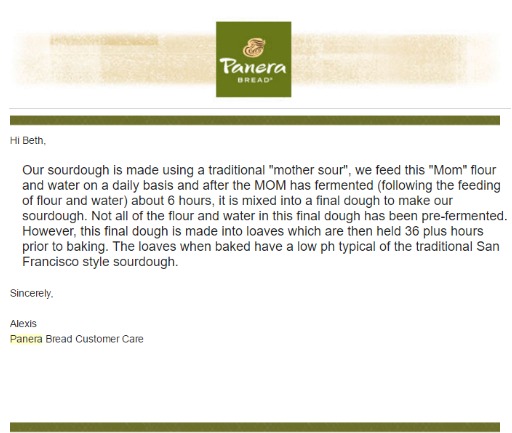
While this answer sounds promising, examining the ingredients of Panera Bread’s sourdough quickly identifies it as a fake. From the Panera website:
Unbleached Enriched Wheat Flour (Flour, Malted Barley Flour, Niacin, Reduced Iron, Thiamine Mononitrate, Riboflavin, [synthetic] Folic Acid), Water, Salt, Yeast (Yeast, Sorbitan Monostearate, Ascorbic Acid [GMO]), Dough Conditioner (Ascorbic Acid [GMO], Microcrystalline Cellulose [refined wood pulp], Corn Starch [GMO])
Not only is the Panera sourdough a phony, but it also contains yeast, wood pulp, and GMOs. It is also fortified with synthetic vitamins including dangerous folic acid (instead of natural folate).
At least The Essential Baking Company’s fake sourdough described earlier in this article is organic. This means no GMOs or other toxic ingredients.
As you can see, the phony sourdoughs on the market today range from simply misleading to downright dangerous. Best to avoid them all and get the real thing!
Do you currently buy an authentic sourdough? If so, what are the ingredients and what is the brand?








Do you know if Berlin bakery is still authentic?Have you talked to the current company you are ordering from to learn of their bread making process?Thanks.
Yes, I have been in contact with this company to ensure the breadmaking is authentic. Berlin Bakery is awesome, but it isn’t organic and still very expensive which have been sticking points for me over the years.
To be fair, the label does say yeast but does not specify which type: wild or commercial. Even some of the best sourdoughs are spiked with a little commercial yeast. I prefer wild yeast for my sourdoughs.
Some bakeries got so far as to add acetic acid and lactic acid to try and reproduce the true sourdough flavor. YUCK!
You’re wrong. All sourdough breads contain yeast. If you create your own “mother” starter, you leave unleavened dough (flour and water) exposed to air for a day. The flour picks up naturally occurring yeast from the air. It also picks up some bad-tasting bacteria, mold, etc. Every couple of days, you have to discard at least half of this dough, add a new batch of flour and water back to the original and then do that again and again for at least a week and sometimes two. The yeast will eventually overpower all the unwanted organisms. This process wastes a lot of flour, but that’s how you do it to start from scratch. Now that you have a “mother” starter, you combine the starter with more flour and water to make your bread dough. Before you bake, let the dough come to room temperature and then take a small part of the new dough and set it aside it in the fridge for the next time you bake. Repeat once a week. If you don’t bake in a particular week, you still must add some fresh flour and water to the “mother” as the YEAST needs “new food”. Please stop saying there is no yeast in sourdough bread. “Sourdough Starter” is dough and yeast!
While natural sourdough starter does contain WILD yeast, using it produces a far different loaf that artificially raising it with BAKERS yeast for a speedy loaf that is cooked at higher temperature. You are arguing semantics, I am talking about reality.
This is normal because Whole wheat flour contains fibers that absorb more water than in a regular white flour.
Thanks!
Hi,
There is no use of yeast in the Essential baking sourdough. Barley malt is different from barley malt syrup. Calling barley malt a sweetener would be compare to saying that corn kernel is an oil! Please check the health benefit of barley malt grain/flour!
Thank you!
Can someone please tell us what Sourdough breads we can buy that are healthy
I link to a healthy sourdough in the article above that I buy for my family. https://www.ovenfreshdelivery.com/products/rustic-sourdough/?aff=37
Your article is spot on with respect to looking for yeast and other added ingredients to spot fake sourdough. However you lost me with the comments about GMO at the end. There is no requirement that “real” sourdough be made with non-GMO flour, only that the ingredient list is only starter, flour, water and salt. There is no evidence that GMO flour is less healthy than non-GMO. Please stick to facts and avoid hype.
Then you go ahead and eat GMOs. I will avoid them and recommend others do as well due to these ominous studies. https://www.thehealthyhomeeconomist.com/from-sterility-to-stomach-holes-11-scientific-reasons-why-you-must-avoid-gmos-now/
You recommend Organic Bread of Heaven, but where are they? I’ve look all over their website, but they don’t tell us what city/state/country they are in.
Near Chicago.
I just want the name of a true sourdough that I can buy at the store. There has just got to be some out there!
There is one … Berlin Bakery, but the slices are very small and dense and the flour is not organic (not good for minimizing gut destroying glyphosate exposure).
I recommend shipping to your door freshly baked from this small company. The prices per organic sourdough loaf are very reasonable and if you order a half dozen or so loaves, the shipping per unit is tiny. https://www.ovenfreshdelivery.com/products/rustic-sourdough/?aff=37
I order once every 2-3 weeks and freeze what I won’t use in a week. It works great!
Hi, would you say that the brand Bread Alone is a good option? Their Certified French Sourdough is: “Organic wheat flour, water, organic whole wheat sourdough, organic whole wheat flour, and sea salt.”
While their San Francisco Sourdough is: “Organic wheat flour, water, and sea salt.”
Then, there Whole Wheat Sourdough option is: Water, organic whole wheat flour, organic wheat flour, organic whole wheat sourdough, and sea salt.”
My concern is the wheat flour vs whole wheat and why the whole wheat option starts with water as their 1st ingredient? if you could give me some help to see if it’s true sourdough?
Seems ok just from the label. It’s very strange to have water as the first ingredient though. I’ve never seen that before anywhere and if you make sourdough yourself, you don’t use mostly water.